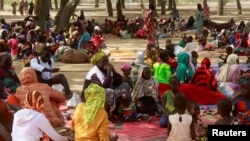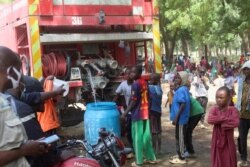Clashes among farmers, ranchers, and fishers over water scarcity have escalated along Cameroon’s northern border with Chad. Cameroonian officials say villages and markets were torched Wednesday and violent conflict sent thousands fleeing into neighboring Chad.
A messenger sent by traditional rulers tells at least 120 people in Kousseri, a town in Cameroon’s northern border with Chad, that without peace, there will be no development, and communities will become poorer. He says armed conflicts will only bring hunger and suffering.
The message is broadcast several times on Cameroon’s CRTV, a government-controlled radio and TV station, in Massa, Mousgoum and Arab Choua languages. Massa, Mousgoum and Arab Choua communities live in the Logone and Chari division, where Kousseri is located.
Government officials in Logone and Chari said they initiated the message of peace after a conflict among farmers, cattle ranchers and fishers over water degenerated into a violent conflict Wednesday in the communities.
On Wednesday night, community leaders said several villages were torched, farms destroyed and parts of the largest market in Kousseri set on fire. They said more than 40 people have been killed, 70 wounded and several thousand civilians have crossed over to Chad for safety. Mahamat Abba is the sultan, a traditional ruler of Kousseri.
Abba said, as the leader of Kousseri, he is reminding people of all communities in the commercial town that they must seek peace, unity and solidarity as long as they live together. He said he is reminding his Mousgoum, Arab Choua and Massa brothers and sisters that peace is priceless. He said a town or community cannot develop when there is war or an armed conflict.
Abba spoke to VOA via the messaging app WhatsApp from Kousseri.
Earlier this week, Cameroon’s authorities said clashes erupted between ranchers and fishers over water in Logone and Chari. Arab Choua cattle ranchers accuse Mousgoum fishers of digging holes that have resulted in deaths of their cows, sheep and donkeys. The Mousgoum fishers dig the holes to conserve water and lure their catch. Mousgoum fishermen also accuse Arab Choua cattle ranchers of allowing their cattle to destroy areas reserved only for fishing.
The government says when fighting erupted again, Massa farmers also accused Arab Choua cattle ranchers of allowing their cattle to destroy plantations. Massa farmers joined Mousgoum fishermen to attack Arab Choua cattle ranchers. Arab Choua have been fighting back.
Midjiyawa Bakari is the governor of Cameroon’s Far North region, where Logone and Chari is located. He said he led a delegation of senior state officials and the military sent by Cameroonian President Paul Biya to Logone and Chari on Wednesday night.
He said Biya asked the delegation to ensure a return to peace among Massa, Mousgoum and Arab Choua communities that are fighting, killing each other and destroying property. Bakari spoke via the messaging app WhatsApp from Kousseri.
Bakari said Biya wants the rival communities to bury their differences and immediately d\rop their weapons for the sake of peace. Bakari said the conflict may discourage many soccer fans from neighboring Chad, Sudan, Niger and Libya who will be travelling to Cameroon through Logone and Chari for the African Football Cup of Nations that begins on January 9. He said Cameroon cannot afford to tarnish its image at a time when the African continent’s attention is focused on the central African state for AFCON.
Bakari said Cameroonians must learn to live together and communities must respect and cherish their linguistic, cultural and religious differences.
Cameroon says desertification is also pushing farmers, fishermen and cattle ranchers to move to places where they can find food and water. Many farmers, cattle ranchers and fishermen settle along the Logone river in the Logone and Chari division for survival leading to regular conflicts.





